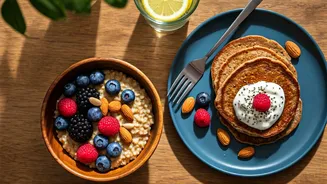The Brain-Gut Connection
The brain and gut communicate through a complex network known as the brain-gut axis. This two-way street involves the central nervous system (CNS), the enteric
nervous system (ENS) within the gut, and the gut microbiome, comprising trillions of microorganisms. When you experience stress or anxiety, your brain triggers the release of stress hormones like cortisol. These hormones can disrupt the normal functioning of your digestive system, leading to symptoms like stomach upset, bloating, or changes in bowel habits. Conversely, an unhealthy gut microbiome can send signals to the brain, potentially affecting mood and cognitive function, creating a vicious cycle. The gut-brain axis underscores how emotions can influence digestion, and vice versa, highlighting the need to address both mental and physical well-being.
Anxiety’s Impact on Digestion
Anxiety can significantly impact your digestion in several ways. The body's 'fight or flight' response, triggered by anxiety, diverts blood flow away from the digestive system, slowing down the digestive process. This can lead to various issues, including constipation. Heightened stress can also increase gut permeability, sometimes called 'leaky gut,' where the intestinal lining becomes more porous, allowing substances to pass into the bloodstream. This can trigger inflammation and exacerbate digestive problems. Moreover, anxiety can increase the sensitivity of the gut, making you more prone to abdominal pain, cramping, and discomfort. Understanding how anxiety affects digestion is the first step toward managing the symptoms and improving your overall well-being. By recognizing the connection, you can begin to adopt strategies that soothe your mind and, in turn, your gut.
Diet and Gut Health
Your diet plays a pivotal role in maintaining a healthy gut and supporting the brain-gut connection. Prioritize a diet rich in fiber, found in fruits, vegetables, and whole grains, to promote regular bowel movements and feed beneficial gut bacteria. Probiotic-rich foods like yogurt, kefir, and fermented vegetables can introduce beneficial bacteria into your gut, fostering a balanced microbiome. Limit processed foods, sugary drinks, and excessive alcohol, as they can disrupt the balance of gut bacteria and worsen digestive symptoms. Consider incorporating foods that are rich in prebiotics, such as onions, garlic, and bananas, which nourish the good bacteria in your gut. A balanced diet not only fuels your body but also supports a thriving gut, leading to a calmer mind and more efficient digestion. Making these dietary adjustments is a proactive step toward achieving digestive harmony.
Stress Management Techniques
Effectively managing stress is crucial for maintaining a healthy gut and supporting the brain-gut connection. Several techniques can help calm your nervous system and reduce anxiety. Practicing mindfulness and meditation can help you become more aware of your thoughts and feelings, allowing you to respond to stressful situations with greater clarity. Deep breathing exercises can activate the parasympathetic nervous system, promoting relaxation and reducing the physical effects of stress on your gut. Regular exercise, such as walking, running, or yoga, is a powerful stress reliever, releasing endorphins that have mood-boosting effects. Spending time in nature can also reduce stress levels. By integrating stress-management techniques into your daily routine, you can create a buffer against the negative impacts of anxiety on your digestive system, fostering a healthier gut and a more balanced emotional state.
Lifestyle Adjustments
In addition to diet and stress management, certain lifestyle adjustments can significantly contribute to improved gut health and the brain-gut connection. Ensure you get enough sleep, as sleep deprivation can disrupt the balance of your gut microbiome and increase stress. Aim for seven to nine hours of quality sleep per night. Regular physical activity is also essential, helping to reduce stress and promoting healthy digestion. Make time for activities you enjoy, whether it's reading, listening to music, or spending time with loved ones. Be mindful of your eating habits, avoiding distractions while eating and chewing your food thoroughly. Consider keeping a food diary to identify potential trigger foods that may be contributing to digestive discomfort. By adopting these lifestyle adjustments, you can create a supportive environment for your gut to thrive, fostering a more harmonious relationship between your brain and your digestive system.













